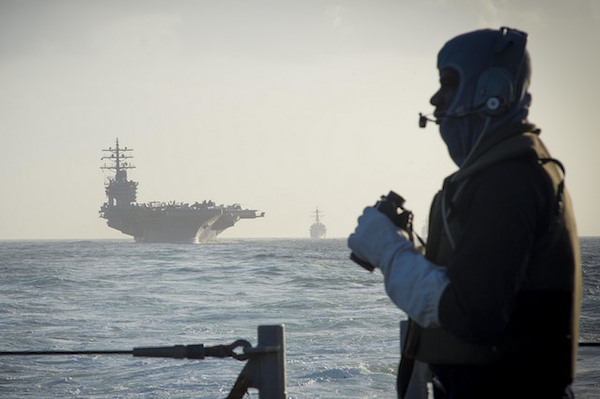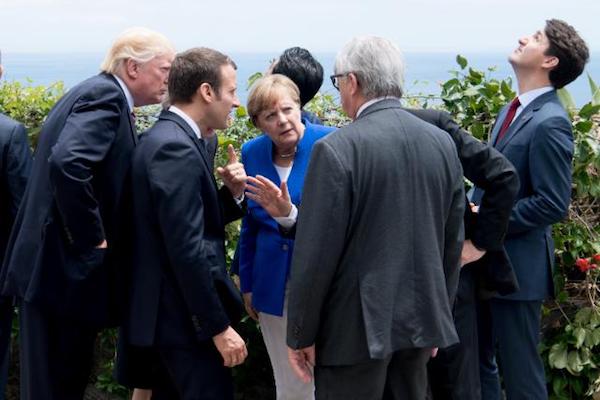With Trump’s departure from the Iran deal, many are mourning the ‘rules based international order.’ But Trump is not the problem: the world has changed, and the idea that the U.S. dominates the world by dint of power, values, wisdom, even God’s decisions is a myth.
By Gordon Adams

America’s place in the world is experiencing an historic turning point. All the mumbo-jumbo about being the “exceptional” and “indispensable” nation, the natural “leader” of something called the “West,” the guarantor of some kind of international system of “rules” is finally being cast into the dustbin of history.
This moment is not just about leaving the Iran nuclear agreement, or even the Trans-Pacific Partnership and the Paris climate agreement. It is not simply attributable to the unpredictable, childish impulses of the current president. Nor is it the result of Obama’s failure to enforce a red line in Syria, or “leading from behind” in Libya. It is not even about Bush’s invasion of Iraq with the goal of regime change, setting in motion the destruction of what little political stability existed in the Middle East.
Of course, it is about all these decisions. But in every case, those decisions, and even the critics of those decisions, have failed to realize how they have played into, helped cause, and now accelerate a fundamental shift in global realities—the centrifugal redistribution of power and influence in the international system that has brought to an end the “American century.” The United States has become just another power in a system for which it no longer sets or enforces the rules, if it ever really did.
Both political parties fail to cope with this reality. Democrats and liberals insist that Trump’s foreign-policy decisions threaten the “rules-based” international order America built and dominated. A simple change in leadership, they believe, can restore order and America’s primacy. Republicans demand bellicose American assertiveness, believing that force and military strength guarantee that the world will behave. Columnists bewail America’s declining status, arguing that greater investment in allies and diplomacy, combined with military engagement might reverse the tide. Think tanks scurry to define new national security and military policies that can put America back on top.
This debate is a circular firing squad. Both liberal Democrats and conservative Republicans are struggling to recreate a myth: that the U.S. dominates the world by dint of power, values, wisdom, even God’s decisions. America, and only America, can bring order and security to the world. Any other option spells chaos.
Power shifts

The latest foreign policy whim—withdrawing from the nuclear agreement with Iran—is the most recent nail in the coffin lid in which the myth is buried. Rather than restore leadership, withdrawing from the agreement simply accelerates the global rebalancing already underway, a tectonic shift that began with the disappearance of the Soviet Union and the end of the Cold War. The signs are everywhere.
In the Middle East, the power shift is palpable. The United States has treated Iran as a pariah since 1979, trying to stuff the ayatollahs back into some imaginary bottle, hoping that they will go away or be overthrown. This approach has failed, and the withdrawal from the nuclear deal will only make that failure more evident. Iran is a regional power, defending its interests, engaging other powers and movements inside and outside the region, such as Russia. U.S. regime change in Iraq not only destabilized the region but helped usher the Iranians into this active regional role. The other influential countries in the region, particularly Saudi Arabia and Israel, will have to deal with this reality.
In addition to these three countries, Russia is also key to regional stability and instability. There’s no way of pushing the Russians out, short of direct conflict. Nor can Turkey be forced to comply with American policy. It is clearly asserting its own interests and influence in three directions at the same time: Central Asia and Russia, Europe, and the Middle East. The invasion of Iraq may have helped open this Pandora’s box. The U.S. is rapidly becoming a marginal player in the chaotic security environment of the Middle East.
In Asia, decades of U.S. condemnation and containment of China have failed. How dare China rise? How dare China steal intellectual property, stifle democracy, arm its artificial islands in the South China Sea, develop a powerful military, mess in Africa (complete with a military base in Djibouti), and intrude into Latin America? And yet, to paraphrase Galileo, “they move.” There is a new, global, competitive player in the system, a reality the United States can not contain or reverse. That player is disrupting that lovely system of rules, acting without U.S. permission or approval. It is even creating new international institutions—an infrastructure development bank and a global trading infrastructure programs (the Belt and Road initiative) to which the U.S. is not even a party. The balance has changed, permanently, and the rules are being rewritten, whether the United States likes it or not.
At the end of the Cold War, American power surrounded Russia, coopting its former satellites, provoking a Russian reaction. Today, the Russian government is, poisoning its citizens overseas, arming Assad, intruding on elections globally, stifling dissent and killing dissenters, and rebuilding its military. Confront Russia, condemn Putin, pretend that they are isolated, treat them with contempt and moral judgment, but Putin does not go away. He is asserting his view of Russia’s interests and Russia’s role in the world, like any great power is likely to do. No amount of U.S. pressure, sanctions, or policy is likely to change that reality. Russia is consciously and actively rebalancing the United States, with some success.
American bullying and presidential rhetoric may have played a role in the apparent, but uncertain, willingness of the North Korean regime to put its nuclear program on the table. But if that program disappears, the putative Nobel Peace Prize may actually belong to President Moon Jae-in of South Korea and even Kim Jong Un, for seizing an opportunity. Even that regional balance and the key players are shifting.
Reckoning with the shift
America has not been able to use its dominant military to prevent this evolution or restore order. Where it has been deployed in large numbers—Iraq and Afghanistan—U.S. military force has failed. War grinds on in Afghanistan with no light suddenly appearing at the end of the tunnel, despite the promises of generations of officers. Rousting the Islamic State from Iraq has not solved the internal problems of that unhappy country, which is still recovering from a U.S. occupation. Special Operations forces in dozens of countries whack at terrorist moles only to find others arising in their place, stimulated by the confrontation. Order is not restored; the American rules are not being obeyed.
If the U.S. fails to read global rebalancing accurately and tries either to bully the rest of the world or to “restore” the liberal international order, the entire world will find itself at an even more dangerous moment. Bullying will only accelerate the centrifugal trend. Asserting the superiority of an American “order” and American “rules” will no longer persuade other rising powers.
The rules will change with the rebalancing. Eliminating the Trump presidency will not restore the previous order. His actions are not an aberration, but an accelerant, spreading the fires that were already under way.
The challenge is to completely redesign U.S. foreign and national security policy to fit with a world where America is just another power, competing and cooperating for influence. The United States must learn to play well with others in the global sandbox.
Gordon Adams is emeritus faculty from American University and a Distinguished Fellow at the Stimson Center. He oversaw national security budgets in the Clinton White House from 1993-97. This article was first published in Lobelog.com, and is reproduced here with permission.
